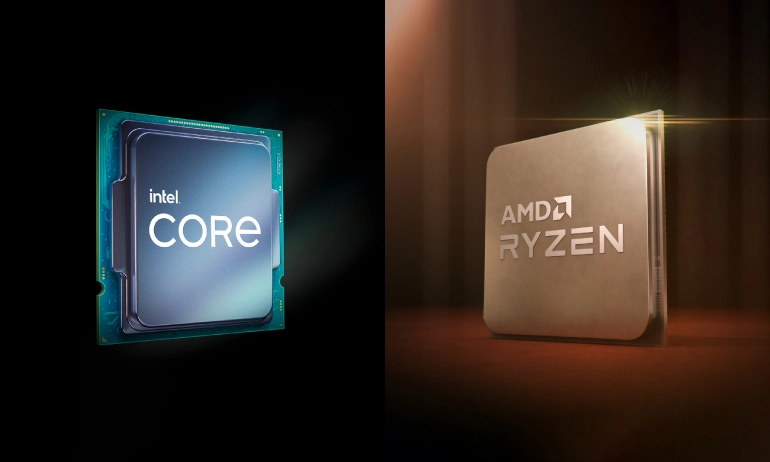AMD Ryzen Processor VS Intel Rocket Lake Processor
Intel’s new Rocket Lake-S series of desktop processors, based on the Crystal Cove architecture, will be released in March. But how will these new chips compare to AMD’s recently released Ryzen 5000 series desktop processors?
While the full specs for the 11th-generation Intel chips are not available yet, enough information has been released that it’s possible to get a sense of each line-up’s strengths and weaknesses.
Intel Offers Slightly Faster Single-Core Performance
While the top multi-core speed of the AMD and Intel processors is comparable, Intel has edged ahead on single-core performance.
The flagship i9-11900k processor in Intel’s Rocket Lake series will be able to boost a single core to a speed of 5.3GHz and all its cores to 4.8GHz for short periods of time, compared to the 4.9GHz multi-core boost speed of the Ryzen 5950X.
Intel is also claiming the 11th-gen processors will offer a significant performance improvement over the previous generation Intel processors, thanks to a 19 percent increase in the number of instructions Rocket Lake processors can execute per clock cycle.
Leaked Geekbench benchmarks of a supposed Rocket Lake processor show a purported i7 11700K beating AMD’s Ryzen 5950X in a single-core benchmark, with the Intel chip achieving a score almost 7.5% higher than the AMD CPU. However, in 2021, single-core performance is less relevant than multi-core, with most modern software being written to spread workloads across multiple processor cores and threads.
Intel is claiming the gaming performance of Rocket Lake’s flagship i9-11900k processor is two to eight percent faster than that of the AMD Ryzen 9 5900X across a range of modern titles, including Cyberpunk 2077 and Assassin’s Creed. However, these benchmarks are yet to be verified by third parties and the Intel benchmark doesn’t include the performance of the Ryzen 5950X, which has both a faster multi-core boost clock and more cores.
Both processor families support PCIe 4.0, offering more bandwidth for hooking up fast SSD NVMe storage and discrete graphics cards, and also support memory with a frequency of up to DDR4-3200.
Image source: Intel
AMD Processors Pack More Cores
The Ryzen 5000 family offers more processor cores and threads than Intel’s Rocket Lake series, with the AMD line-up topping out with the 16-core and 32-thread 5950X, while the Intel series will only offer up to eight cores and 16 threads, a decrease on the core count of 10th-generation Intel processors.
Even if the Rocket Lake processors can handle some 19 percent more instructions per clock than previous gen Intel processors, this may not be enough to close the significant gap between AMD and Intel CPUs in multi-threaded performance.
For example, when comparing AMD’s Ryzen 5000 series with 10th-generation Intel processors, Arstechnica found that in the Cinebench R20 CPU multi-threaded test the Ryzen 5950X scored 10085 compared to 6,583 for the Intel Core i9-10900K, while in Geekbench the Ryzen processor managed a score of 15,102, compared to 11,085 for the Intel chip.
Image source: AMD
Intel’s Processors Come with an Integrated GPU
Intel Rocket Lake processors will likely be a good choice if you don’t want to buy a separate GPU but still want a computer that can play 8K video and run some 3D games at low to medium settings.
The Rocket Lake series will include the Xe integrated graphics chip, already used in Intel 11th-generation laptop processors based on the Tiger Lake architecture, which were released last year.
In testing, an Intel i7 based on the Tiger Lake architecture with an integrated Xe GPU nearly doubled the Frames Per Second (FPS) in the game Metro Exodus, compared to the performance of integrated GPUs in a 10th-generation Intel processor. However, the Xe GPU still only managed to output 13 FPS in the game, far short of the 30 FPS considered the minimum for enjoyable gameplay in 3D first-person shooter games, demonstrating the limitations of integrated GPUs compared to discrete graphics cards.
In comparison, the AMD Ryzen 5000 series processors don’t include integrated graphics, so they require a separate discrete graphics card for the likes of modern gaming.
AMD’s Chips May Have Lower Power Consumption
While the full specs of Rocket Lake processors have not been revealed, early indications are that the energy consumption of the Intel 11th-gen processors is broadly similar to the previous gen, with the unlocked K and KF-series processors having a TDP-rating of 125W, while the locked, non-K processors have a rating of 65W.
Meanwhile, AMD’s 5000 series chips have a lower TDP-rating, 105W for the higher end 5950X, 5900X and 5800X processors and 65W for the less powerful 5600X.
Both Intel and AMD Offer an Upgrade Path
Both the Intel and the AMD series of processors offer reasonable backwards compatibility for people upgrading from older PCs who don’t want to replace their existing motherboard.
Intel Rocket Lake processors plug into the LGA 1200 socket, used on the 400-series chipset motherboards released for Intel 10th-generation processors, meaning it should be compatible with some existing boards, although Intel has also released a specification for new 500-series chipset boards to be used with Rocket Lake CPUs.
Meanwhile the AMD Ryzen plugs into the AM4 socket used by earlier processors, and can be used with a wide range of 500-series and even some 400-series chipset boards, providing they have had a firmware upgrade.


